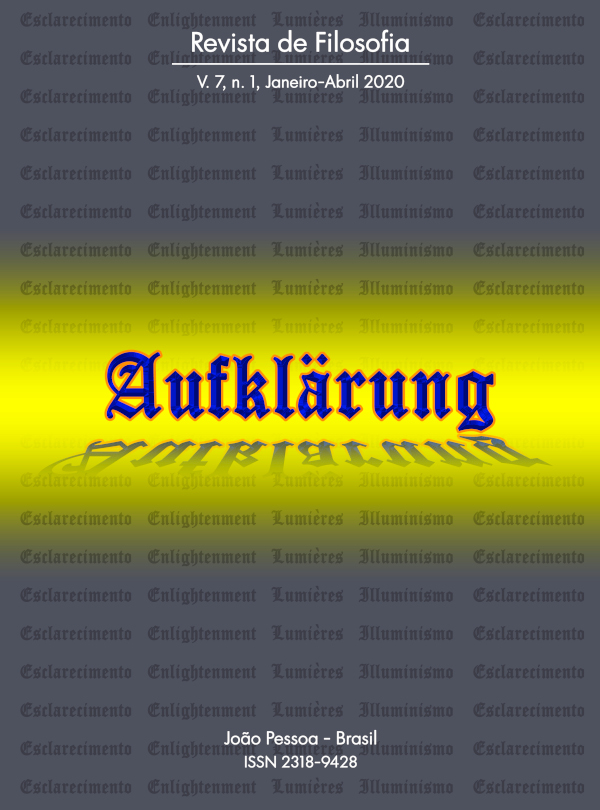Rousseau beyond oneself: Nietzsche and the psychological profile of Rousseauism
DOI:
https://doi.org/10.18012/arf.v7i1.48047Keywords:
Iluminism, Unconscious, Soul, Cogito, TypesAbstract
Abstract: The main purpose of this article is to rehabilitate and deepen a feature of the relation between Nietzsche and Rousseau that has been relegated by the Nietzsche research, possibly by considering it obvious and by supposing that there is nothing more to say about, i. e., Nietzsche critic of Rousseau. Then, we propose to bring to light this feature, with an emphasis on the very scope the German philosopher is considering in his critical comments: the unconscious sphere, that gave directions to Rousseau'´s philosophy and to rousseauism. In this sense, we shall discuss the attack on the ancient notion of soul by Descartes in 17th century, the increasing weakening of this notion on account of the Scientific Revolution from 17th and 18th centuries, the reaction of some of 18th century representatives to what we may refer as a disenchantment of the world, the reaction of Rousseau. According to Nietzsche, the reaction of Rousseau, more than an autonomous philosophical contribution, would be an unconscious incidence of the the philosopher and his followers in ancestors devices of man-nature relation, namely, figuring a Golden era in a past of gods and heroes and ascribing to external environment threats percieved as internal ones.
Downloads
References
ANSELL PEARSON, K. Nietzsche contra Rousseau. A study of Nietzsche´s Moral and Political Thought. Cambridge: Cambridge University Press, 1991.
BURNS, W. E. Science in the Enlightenment. An Encyclopaedia. Santa Barbara CA: ABC Clio, 2003.
CHAUÍ, M. “Um anacronismo interessante”. In: Martins, A., Santiago, H. & Oliva L. C. As ilusões do eu. Spinoza e Nietzsche. Rio de Janeiro: Civilização Brasileira, 2011, p. 323-348.
HARDT, L. S. “Rousseau e Nietzsche: de como a ideia da natureza estabelece o devir”. In: Cadernos de ética e filosofia política, n. 21 (2012): Rousseau: Natureza e Sociedade, p. 207- 218.
KRIEGER, S. “Um olhar de Nietzsche ao século XVII: os subterrâneos da revolução cartesiana”. In: Cadernos Nietzsche, vol. 39. n. 3, 2018,
NIETZSCHE, F. Sämtliche Werke – Kritische Studienausgabe (KSA). Edição organizada por Giorgio Colli e Mazzino Montinari. Berlim: De Gruyter & Co., 1988, 15 vols.
__________. A gaia ciência. Trad. Paulo César de Souza. São Paulo: Companhia das Letras, 2011.
__________. Além do bem e do mal. Trad. Paulo César de Souza. São Paulo: Companhia das Letras, 1999.
__________. Aurora. Trad. Paulo César de Souza. São Paulo: Companhia das Letras, 2008.
__________. Crepúsculo dos ídolos. Trad. Paulo César de Souza. São Paulo: Companhia das Letras, 2010.
__________. Humano, demasiado humano. Trad. Paulo César de Souza. Trad. Paulo César de Souza. São Paulo: Companhia das Letras, 2012.
__________. O andarilho e sua sombra (Humano, demasiado humano II). Trad. Paulo César de Souza. São Paulo: Companhia das Letras, 2008.
VIESENTEINER, J. L. “Algumas refutações sobre a crítica de Nietzsche a Rousseau”. In: Anais do II Colóquio Rousseau, Instituto de Filosofia e Ciências Humanas – IFCH, Unicamp.
Additional Files
Published
How to Cite
Issue
Section
License
Journal general policy
1.This journal works under a Creative Commons License aplied to online journals. That icence can be read in the following link: Creative Commons Attribution 4.0 International (CC BY 4.0).
2.Accordingly to this License, a)the journal declares that authors hold the copyright of their articles without restrictions, and they can archieve them as post-print elsewhere. b)the journal allow the author(s) to retain publishing rights without restrictions.
Metadata Policy for information describing items in the repository
1. Anyone may access the metadata free of charge at anytime.
2.The metadata may be re-used in any medium without prior permission, even commercial purposes provided the OAI Identifier or a link to the original metadata record are given, under the terms of a CC BY license refered for the Journal.







































